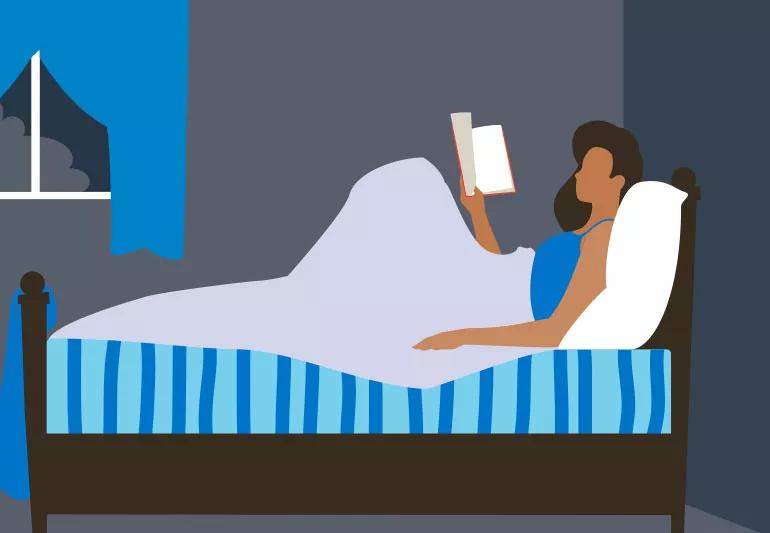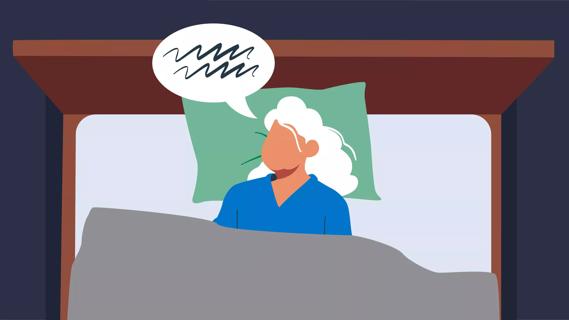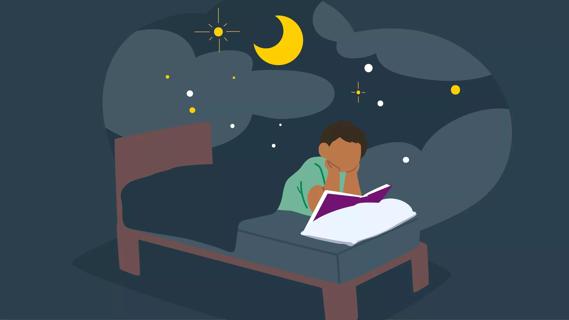Advertisement
Winding down before bed is key to better sleep

You know that feeling after a great night’s rest? When you wake up all energized and ready to tackle your day like a hyperactive squirrel who’s had a few too many energy drinks?
Advertisement
Cleveland Clinic is a non-profit academic medical center. Advertising on our site helps support our mission. We do not endorse non-Cleveland Clinic products or services. Policy
Oh … not sounding familiar?
You’re not alone.
The U.S. Centers for Disease Control and Prevention (CDC) estimates that 1 in 3 people in the United States don’t get the sleep they need on a regular basis. That means 33% of adults are living with sleep deprivation.
And it’s more serious than just a case of the morning groggies. Missing out on sleep can have damaging effects across your mind and body.
“Sleep is foundational to health and wellness,” says sleep medicine specialist Nancy Foldvary-Schaefer, DO, MS. “We know that getting enough sleep and getting good sleep are necessary for cardiovascular health, metabolic health and even brain health.”
One key to getting those quality ZZZs? A consistent bedtime routine and sleep environment that encourages healthy sleep — what experts call sleep hygiene. A lot is said about the importance of sleep routines for babies and kids. But grownups need those rituals, too. Because routines that encourage good sleep are a gateway to better well-being.
How can you improve your sleep hygiene and wake up refreshed? Dr. Foldvary-Schaefer shares advice.
“Sleep hygiene” is a term that refers to the healthy habits, behaviors and environmental factors that you can take charge of to help you get a good night’s sleep.
“Sleep hygiene is essentially the prep work we can do to protect our sleep and ensure we sleep well,” Dr. Foldvary-Schaefer explains.
While some people will boast about getting by on little shuteye, the truth is that most adults need a solid seven to nine hours of sleep each night.
Consider this: Recent studies have shown that not getting enough sleep causes accumulations of toxins in the brain that can lead to Alzheimer’s disease. Other research has shown that people who have chronic sleep disorders are more likely to develop conditions like:
Advertisement
So, yes, getting enough quality sleep matters. A lot.
And setting the mood for a restful night’s sleep with healthy sleep hygiene practices is one way to make sure your body will get the rest it needs.
“We talk so much about a healthy diet and exercise and forget that sleep is another important part of that conversation,” Dr. Foldvary-Schaefer relates. “Many of us have adopted poor sleep hygiene habits that really sabotage us from getting a good night’s sleep.”
Dr. Foldvary-Schaefer says that the key to a good night’s sleep starts long before your head hits the pillow. Try these strategies for better sleep hygiene:
Sure, sleeping in on the weekends may sound like bliss, but what your body really craves is consistency.
“One thing we promote is standard bedtimes and wake times. And of the two, the one that’s actually more important is having a regular wake-up time,” Dr. Foldvary-Schaefer advises.
The idea is that by keeping your timing consistent, you’re essentially training your circadian rhythm — your body’s natural internal clock — to go to sleep and wake up at appropriate times.
When your body gets used to going to bed and waking up at the same time, you’ll be better primed to fall asleep faster and wake up more refreshed. No more tossing and turning. No more snooze-button-hitting.
There’s no bedtime that’s perfect for everyone. You’re not Cinderella. There’s no clock that’s going to turn your car into a pumpkin if you don’t get into bed at the stroke of midnight.
Instead, your best bedtime will depend on how much sleep you need (remember, seven to nine hours is typical) and counting back.
Let’s do some quick math:
Advertisement
Say you need eight hours of sleep. If you need to wake up at 7 a.m. to get ready for work, your bedtime should be 11 p.m. That doesn’t mean you’re brushing your teeth at 11 p.m., though. That means your eyes are shutting at 11.
Good sleep hygiene starts before then. So, subtract another hour from your bedtime, and follow a calming bedtime routine.
That hour is an important one. It’s your time to start telling your body and your mind that it’s time to wind down. So, protect that hour as a time for you relax after a long day.
What do you do in that hour?
Your bedroom should be your haven — a comfortable, safe place for some R&R.
“In terms of sleep hygiene, the bed is for sleep and intimate relations. It’s not for other things,” Dr. Foldvary-Schaefer states. “It’s not a place to use your laptop, watch movies or have long conversations. Those things will eventually promote a sloppier sleep hygiene that, in turn, will reduce your quality and quantity of sleep.”
Focus on making your bed and your bedroom a place that encourages sleep. How?
As your body winds down for sleep, so does your digestive system. So late-night eating and drinking can take a toll. Aim to not eat in the three hours before bedtime.
“It’s not healthy to be eating late at night, and some people can be affected with reflux or will be uncomfortable when eating late at night,” Dr. Foldvary-Schaefer adds.
And keep an eye on your caffeine and alcohol intake late in the day, too.
“Alcohol is the most common drug used to help promote sleep, and that’s because it does have a sedative-hypnotic effect. But it metabolizes quickly, and it really wreaks havoc on the quality of sleep, particularly REM sleep,” Dr. Foldvary-Schaefer cautions.
You know the drill. You crawl into bed. Your body is exhausted. But your mind has other plans.
Putting your mind to rest is key to good sleep hygiene. Dr. Foldvary-Schaefer suggests a few ways to calm your racing mind and get to sleep faster:
Advertisement
Getting enough exercise is important for your health. And it’s an important part of having good sleep hygiene, too. But timing matters.
“Exercise is going to rev up stimulating hormones in the body. It’s important to exercise, but do it in the afternoon or in the early evening,” Dr. Foldvary-Schaefer recommends. “Exercising within the hour or two before bedtime can trigger insomnia or difficulty falling asleep.”
Fitful sleep isn’t something you have to deal with on your own. If you’ve tried it all and still can’t get the sleep you need, talking to a healthcare provider, like a primary care physician or sleep medicine expert, can make a difference.
“When sleep problems continue for at least three months, they become diagnosable sleep disorders,” Dr. Foldvary-Schaefer notes. “The sooner we diagnose things, the faster we treat them, and the better people feel, and the more protective sleep becomes for your health.”
Sweet dreams!
Advertisement
Learn more about our editorial process.
Advertisement

From newborn through teen years, your child’s sleep needs will change

Sleeping with separate blankets can help you get the ZZZs you need — without fighting for covers all night

Stress, weight gain and forgetfulness are just a few effects of losing sleep

Stress, alcohol, sleep apnea and (you guessed it!) scary movies are a few common causes of bad dreams

Recording your dreams may help you become more mindful, understand your thought patterns, process your emotions and even reduce your stress

Chamomile, lavender and valerian root teas may offer a faster route to dreamland

Many factors can contribute to sleep talking, like stress or anxiety, lack of or low-quality sleep, or even more serious sleep-related conditions

A consistent, structured routine, which may include incentives, can help children learn to stay in bed and get the ZZZs they need

Focus on your body’s metabolic set point by eating healthy foods, making exercise a part of your routine and reducing stress

PFAS chemicals may make life easier — but they aren’t always so easy on the human body

While there’s little risk in trying this hair care treatment, there isn’t much science to back up the claims